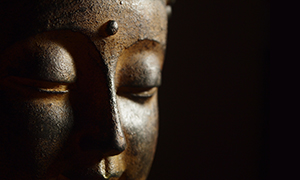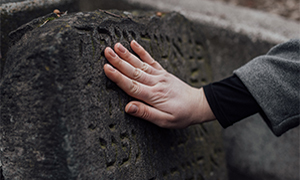
Transcription and editing: Kirsten & Jonas Doctor
I do not spend time on my identity as a Buddhist. I live by what I consider to be the essence of the Buddha’s words. Life after life has ended with me leaving my body, and my mind continuing to a new life. What the new life will be like, I have no idea. I know only one thing: Throughout all my lives …
… I will practice to develop a calm mind; for it to be more harmonious. I will practice generosity and compassionate love, treating other beings with respect. To me, this is the essence of the Buddha’s teachings.
Postscript [ed.]
On October 6th 2020, on the very day of the founding of the association Simply Sharing and thus the start of the project “lakhalama.org,” Rinpoche was asked, “What is actually the essential meaning of Dharma?”
Rinpoche replied: “Dharma is a calm mind.”

Transcription and editing: Kirsten & Jonas Doctor
I have something I would like to share with you. As human beings, we need each other. Not just for practical and economic reasons. We need someone to share our thoughts and ideas with. When we realize that we need each other, then we naturally respect each other and meet at eye level …
People grow up in different countries and come from different cultures. I myself was born and raised in Tibet. It is important that we share our experiences and our diversity with each other. Differences between people are reflected in what we believe in. The Tibetan culture is associated with Buddhism, Indian culture with Hinduism and the Arab culture with Islam. Religion and culture are intertwined.
For me, it is important to notice the differences between us and still be able to live together. It is not an attitude that originates from my faith. It’s an attitude that emanates from my heart. For all people share a very basic quality. Simply and completely said: Everyone is born with a warm heart.
We want each other to be well
Our warm heart is expressed in the fact that we basically wish each other well, whether it is our family and friends, humanity, or other beings in general. In this regard it does not matter where in the world we come from. Religion only comes into the picture when we feel powerless, for example if a family member or friend is in trouble, and there is nothing we can do about it. Then we ask for help from something higher. If we are Buddhists, we pray to the Buddhas and Bodhisattvas, if we are Christians or Hindus, we turn to God or Shiva, and if we are Muslims, we ask Allah for help. To whom we turn is subordinate to our basic desire to help. My point is that the desire to help is a primordial part of our being.

Transcription and editing: Kirsten & Jonas Doctor
We humans often talk about loss. This is something we are very afraid of. But if instead of using the word “lose” you said “put behind you,” then you would automatically focus on what you have in front of you, rather than behind you. If there is something we dream about, then it is no use staying where we are. We need to move forward and act now and here …
… When we move towards our goals, it does not mean that we lose the steps we take to get there. No, we put them behind us. When you move forward, you necessarily put something behind you—otherwise you will get nowhere. There are many things that you can put behind you—for example, certain ideas and conceptions—and instead focus in the present on actions moving towards what lies ahead. Never stand still. Do not go backwards.
If, for example, we want to become more loving and compassionate, well—then we need to put our anger behind us. We do not “lose” our anger. We put it behind us. When you put something behind you, there is no sense of poverty. On the contrary. But as soon as we use the word “lose,” the alarm bells ring and we hurry back to our starting point. When you put something behind you, everything is as it should be. I put something behind me and move on.
I am sharing my thoughts with you. It is important that we share our thoughts and experiences with each other and give each other encouragement and inspiration. It is one of the most beautiful and meaningful things we can do.

An afternoon talk with Lakha Lama, June 3rd 2020
By M. Wendelboe
I was sitting with Rinpoche and his wife Pia Kryger in their garden, enjoying some cake and refreshments. Pia and I were talking about the state of the world and she invited me to ask Rinpoche a question, which she could communicate to him as his hearing ability is heavily reduced …
Question:
Given the vivid display of the current state in the world—racists killings in the US, the chaos of leadership in the US and many other places, the COVID-19 situation, all the secrecy and power games, the media propaganda etc.—how can you handle all this; how will you know what to believe in?
Lakha Lama:
There is a Tibetan saying that when you reach the bottom of the bowl the worst dirt will surface.
When the timing and conditions come together, it will happen.
This is when we see the Dharma being misused in many ways.
Question:
But to an unenlightened being like me, who cannot see clearly, and when you are bombarded with drama, hysteria and ignorance from all angles, how do you then stay grounded, keep a clear mind and know what to believe, when there is no one to trust and whom you can depend on…?
Lakha Lama:
Trust in your self-confidence and what YOU SEE.
[laughing] It is good that we have this delicious strawberry pie.